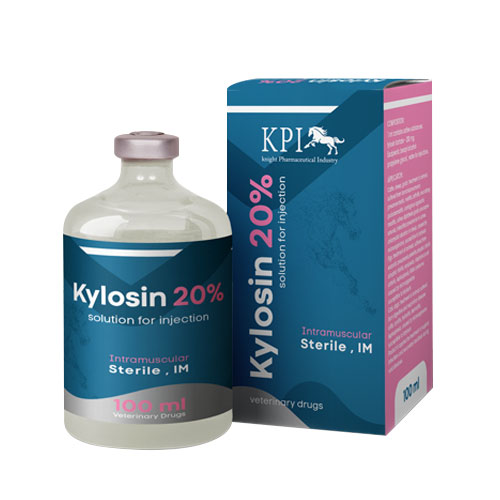
COMPOSITION:
1 ml contains active substances :
Tylosin tartrate – 200 mg.
PHARMACOLOGICAL CHARACTERISTICS:
Tylosin, derived from Streptomyces fradiae, predominantly comprises tylosin A. It effectively targets various gram-positive and some gram-negative microorganisms, including Streptococcus spp., Staphylococcus spp., Corynebacterium spp., and others, as well as mycoplasmas, chlamydia, rickettsia, and spirochetes. Tylosin exerts its bacteriostatic effect by irreversibly binding to the 50S subunit of bacterial ribosomes, inhibiting protein synthesis and microbial growth.
APPLICATION:
Tylosin is indicated for treating a range of conditions in cattle, sheep, and goats, including bronchopneumonia, pneumoenteritis, mastitis, and others caused by tylosin-sensitive microorganisms. In pigs, it treats enzootic pneumonia, dysentery, and other infections. In dogs and cats, it addresses digestive and respiratory canal diseases, otitis, cystitis, and more. Additionally, it’s used for surgical infections and secondary bacterial infections in viral diseases.
DOSAGE:
Administered intramuscularly once daily, the recommended doses are as follows:
- Cattle: 1-2 ml per 10 kg of body weight
- Sheep, goats: 1.0-2.0 ml per 10 kg of body weight
- Pigs: 2.0 ml per 10 kg of body weight
- Dogs, cats: 1.0-2.0 ml per 10 kg body weight. Discontinue treatment within 24 hours after symptoms resolve or within 5 days of application. Divide doses exceeding the recommended amount and administer at multiple sites.
CONTRAINDICATIONS:
Avoid use in animals hypersensitive to tylosin or in the first week of life. Do not combine with penicillins, cephalosporins, or lincomycin due to diminished tylosin efficacy. Not for use in horses, rabbits, guinea pigs, or hamsters.
PRECAUTIONS:
Meat consumption is permissible 8 days post-treatment, and milk consumption is allowed after 4 days.
PACKAGING:
Available in 50 ml and 100 ml glass vials.
STORAGE:
Store in a dry, dark place at temperatures between 5°C to 25°C, out of reach of children.
FOR VETERINARY USE ONLY!
